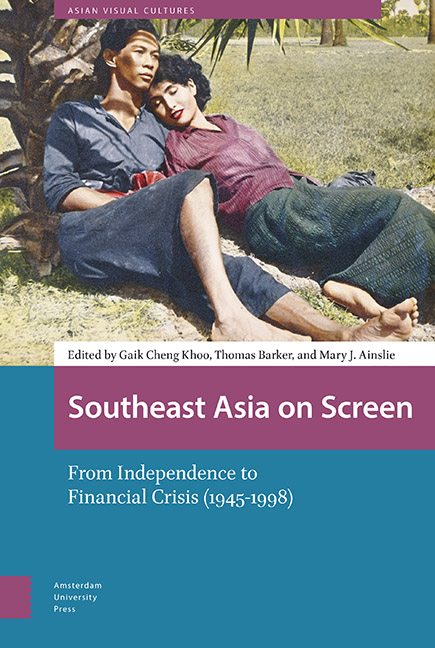Book contents
- Frontmatter
- Contents
- List of Illustrations
- Introduction: Southeast Asia on Screen: From Independence to Financial Crisis (1945–1998)
- Section 1 Independence and Post-World War II Filmmaking: Nation-building, Modernity and Golden Eras
- Section 2 Key Directors
- Section 3 Popular Pleasures
- About the Authors
- Index
12 - Mapping Regional Ambivalence and Anxieties in They Call Her… Cleopatra Wong
Published online by Cambridge University Press: 20 November 2020
- Frontmatter
- Contents
- List of Illustrations
- Introduction: Southeast Asia on Screen: From Independence to Financial Crisis (1945–1998)
- Section 1 Independence and Post-World War II Filmmaking: Nation-building, Modernity and Golden Eras
- Section 2 Key Directors
- Section 3 Popular Pleasures
- About the Authors
- Index
Summary
Abstract
THEY CALL HER… CLEOPATRA WONG (Bobby A. Suarez, 1978) has been contextualized within film scholarship as a transnational text, a cult product, a canonical text of exploitation cinema and a key work within the Asian spy genre. This chapter argues that the film contributes to the ways in which popular culture negotiated political and economic tensions surrounding the development and presence of ASEAN since it was founded in 1967. One such tension revolved around striking a delicate balance between regional cooperation and the recognition of national sovereignty. Using Kristin Thompson's framework of cinematic excess, I argue that the film imagines and images this tension by positioning Wong as the force which reifies the primacy of ASEAN, while the film's representation of landscapes foregrounds and privileges national specificity.
Keywords: ASEAN, Cleopatra Wong, cinematic excess, Singapore, Philippines, cultural text
Released in 1978, THEY CALL HER… Cleopatra Wong (directed by Bobby A. Suarez) showcases the daring exploits of Interpol agent extraordinaire Cleopatra Wong (Marrie Lee aka Doris Young) as she is tasked by Interpol chiefs from Singapore and the Philippines to break up a counterfeit currency ring. With resolve and conviction, Cleopatra Wong harnesses a defence network of Interpol agents and together they soon discover a shadow organization, seeking to flood ASEAN member countries with counterfeit currency in order to capitalize on the anticipated collapse of the new ASEAN economy. Made with a budget of approximately US$70,000, the film earned global cult status, even counting American filmmaker Quentin Tarantino as a fan (Uhde and Uhde 2010, p. 53).
Despite such popular and global appeal, the film has barely received sustained scholarly interest. Those who have engaged with the work position it as a transnational text (Baumgärtel 2006), a cult object (Baumgärtel 2006; Paul 2007; Yew 2011), a seminal work of exploitation cinema (Paul 2007; Baumgärtel 2006) and a representative of the Asian spy genre (Yew 2011). Yet few of these works, save Yew's essay, have given much critical or sustained attention to the prominent presence of ASEAN within the film's diegesis and dialogue. Yew situates ASEAN within a broader analysis of director Bobby A. Suarez's oeuvre in connection with ‘Cold War cultural studies’ (Yew 2011, p. 289).
- Type
- Chapter
- Information
- Southeast Asia on ScreenFrom Independence to Financial Crisis (1945–1998), pp. 255 - 270Publisher: Amsterdam University PressPrint publication year: 2020



